Aleksandra Eliseeva
EnvBench: A Benchmark for Automated Environment Setup
Mar 18, 2025Abstract:Recent advances in Large Language Models (LLMs) have enabled researchers to focus on practical repository-level tasks in software engineering domain. In this work, we consider a cornerstone task for automating work with software repositories-environment setup, i.e., a task of configuring a repository-specific development environment on a system. Existing studies on environment setup introduce innovative agentic strategies, but their evaluation is often based on small datasets that may not capture the full range of configuration challenges encountered in practice. To address this gap, we introduce a comprehensive environment setup benchmark EnvBench. It encompasses 329 Python and 665 JVM-based (Java, Kotlin) repositories, with a focus on repositories that present genuine configuration challenges, excluding projects that can be fully configured by simple deterministic scripts. To enable further benchmark extension and usage for model tuning, we implement two automatic metrics: a static analysis check for missing imports in Python and a compilation check for JVM languages. We demonstrate the applicability of our benchmark by evaluating three environment setup approaches, including a simple zero-shot baseline and two agentic workflows, that we test with two powerful LLM backbones, GPT-4o and GPT-4o-mini. The best approach manages to successfully configure 6.69% repositories for Python and 29.47% repositories for JVM, suggesting that EnvBench remains challenging for current approaches. Our benchmark suite is publicly available at https://github.com/JetBrains-Research/EnvBench. The dataset and experiment trajectories are available at https://jb.gg/envbench.
Towards Realistic Evaluation of Commit Message Generation by Matching Online and Offline Settings
Oct 15, 2024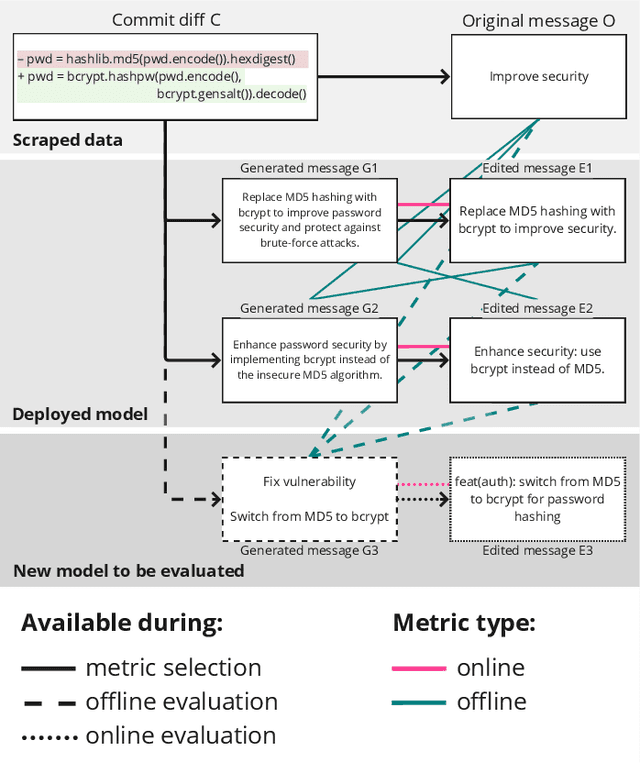
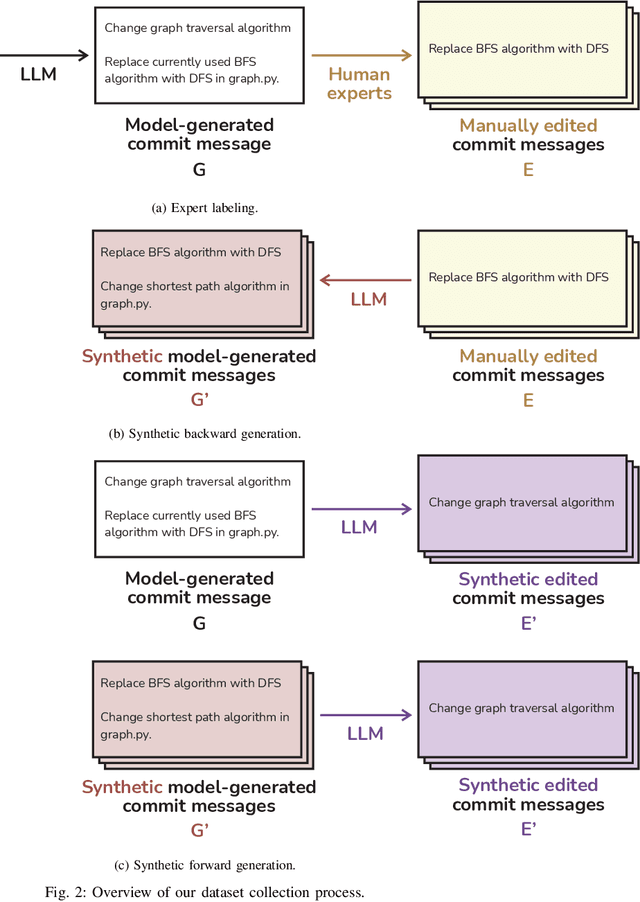
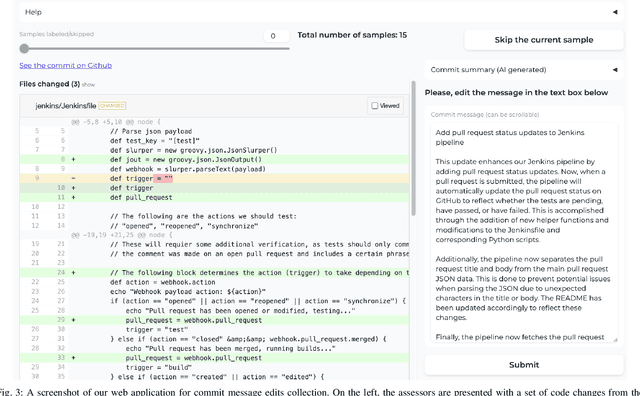
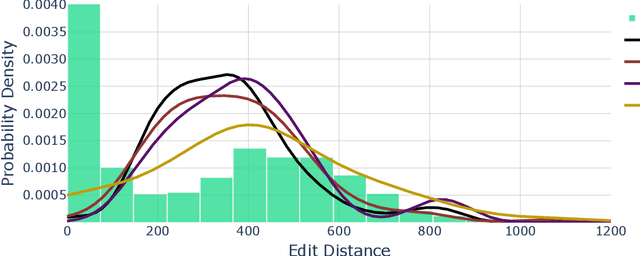
Abstract:Commit message generation (CMG) is a crucial task in software engineering that is challenging to evaluate correctly. When a CMG system is integrated into the IDEs and other products at JetBrains, we perform online evaluation based on user acceptance of the generated messages. However, performing online experiments with every change to a CMG system is troublesome, as each iteration affects users and requires time to collect enough statistics. On the other hand, offline evaluation, a prevalent approach in the research literature, facilitates fast experiments but employs automatic metrics that are not guaranteed to represent the preferences of real users. In this work, we describe a novel way we employed to deal with this problem at JetBrains, by leveraging an online metric - the number of edits users introduce before committing the generated messages to the VCS - to select metrics for offline experiments. To support this new type of evaluation, we develop a novel markup collection tool mimicking the real workflow with a CMG system, collect a dataset with 57 pairs consisting of commit messages generated by GPT-4 and their counterparts edited by human experts, and design and verify a way to synthetically extend such a dataset. Then, we use the final dataset of 656 pairs to study how the widely used similarity metrics correlate with the online metric reflecting the real users' experience. Our results indicate that edit distance exhibits the highest correlation, whereas commonly used similarity metrics such as BLEU and METEOR demonstrate low correlation. This contradicts the previous studies on similarity metrics for CMG, suggesting that user interactions with a CMG system in real-world settings differ significantly from the responses by human labelers operating within controlled research environments. We release all the code and the dataset for researchers: https://jb.gg/cmg-evaluation.
Long Code Arena: a Set of Benchmarks for Long-Context Code Models
Jun 17, 2024



Abstract:Nowadays, the fields of code and natural language processing are evolving rapidly. In particular, models become better at processing long context windows - supported context sizes have increased by orders of magnitude over the last few years. However, there is a shortage of benchmarks for code processing that go beyond a single file of context, while the most popular ones are limited to a single method. With this work, we aim to close this gap by introducing Long Code Arena, a suite of six benchmarks for code processing tasks that require project-wide context. These tasks cover different aspects of code processing: library-based code generation, CI builds repair, project-level code completion, commit message generation, bug localization, and module summarization. For each task, we provide a manually verified dataset for testing, an evaluation suite, and open-source baseline solutions based on popular LLMs to showcase the usage of the dataset and to simplify adoption by other researchers. We publish the benchmark page on HuggingFace Spaces with the leaderboard, links to HuggingFace Hub for all the datasets, and link to the GitHub repository with baselines: https://huggingface.co/spaces/JetBrains-Research/long-code-arena.
On The Importance of Reasoning for Context Retrieval in Repository-Level Code Editing
Jun 06, 2024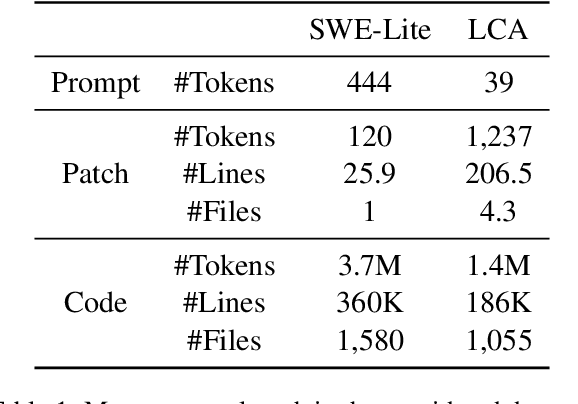
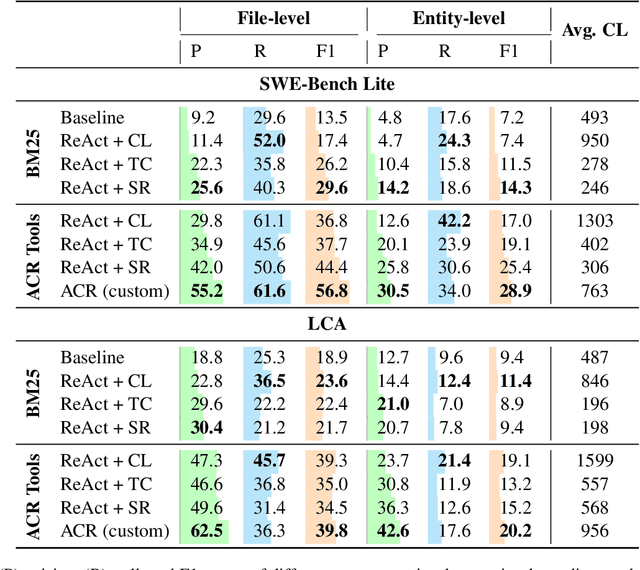
Abstract:Recent advancements in code-fluent Large Language Models (LLMs) enabled the research on repository-level code editing. In such tasks, the model navigates and modifies the entire codebase of a project according to request. Hence, such tasks require efficient context retrieval, i.e., navigating vast codebases to gather relevant context. Despite the recognized importance of context retrieval, existing studies tend to approach repository-level coding tasks in an end-to-end manner, rendering the impact of individual components within these complicated systems unclear. In this work, we decouple the task of context retrieval from the other components of the repository-level code editing pipelines. We lay the groundwork to define the strengths and weaknesses of this component and the role that reasoning plays in it by conducting experiments that focus solely on context retrieval. We conclude that while the reasoning helps to improve the precision of the gathered context, it still lacks the ability to identify its sufficiency. We also outline the ultimate role of the specialized tools in the process of context gathering. The code supplementing this paper is available at https://github.com/JetBrains-Research/ai-agents-code-editing.
From Commit Message Generation to History-Aware Commit Message Completion
Aug 15, 2023



Abstract:Commit messages are crucial to software development, allowing developers to track changes and collaborate effectively. Despite their utility, most commit messages lack important information since writing high-quality commit messages is tedious and time-consuming. The active research on commit message generation (CMG) has not yet led to wide adoption in practice. We argue that if we could shift the focus from commit message generation to commit message completion and use previous commit history as additional context, we could significantly improve the quality and the personal nature of the resulting commit messages. In this paper, we propose and evaluate both of these novel ideas. Since the existing datasets lack historical data, we collect and share a novel dataset called CommitChronicle, containing 10.7M commits across 20 programming languages. We use this dataset to evaluate the completion setting and the usefulness of the historical context for state-of-the-art CMG models and GPT-3.5-turbo. Our results show that in some contexts, commit message completion shows better results than generation, and that while in general GPT-3.5-turbo performs worse, it shows potential for long and detailed messages. As for the history, the results show that historical information improves the performance of CMG models in the generation task, and the performance of GPT-3.5-turbo in both generation and completion.
 Add to Chrome
Add to Chrome Add to Firefox
Add to Firefox Add to Edge
Add to Edge